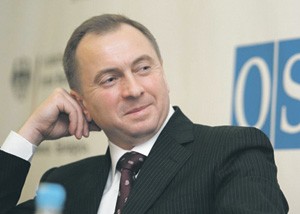
Belarus and the West: Reemerging From the Abyss
Publication: Eurasia Daily Monitor Volume: 11 Issue: 134
By:

As Russia’s relations with the West rapidly deteriorate, there are noticeable signs that Belarus’s relations with the West are improving. Thus, during a July conference with Belarus’s ambassadors and consular workers, Vladimir Makei, the Belarusian minister of foreign affairs, averred that “recently, we managed to shape a constructive dialogue with the United States. Also, our permanent critics—Poland, Sweden and Germany—have significantly relaxed their anti-Belarusian rhetoric; and the European Union began to talk to Minsk directly” (Belarus Segodnia, July 18).
Earlier, Denis Melyantsov from the Belarusian Institute for Strategic Studies, a Minsk-based think tank funded by the West, described the new format of the EU-Belarus dialogue devoted to the modernization of Belarus, the so-called Interim Phase (see EDM, March 4). This new format is different from the so-called European Dialogue on Modernization (EDOM), which on the Belarusian side involved only representatives of the opposition. The Belarusian government declined participating in the EDOM on the grounds that it was not allowed a role in shaping this program and was treated without due respect. According to Melyantsov, European politicians came to the conclusion that no practical success can be achieved without involving actual decision makers and that relying on sanctions has not worked either. “This is much like a theoretical problem,” writes Meluyantsov, “how to separate the Belarusian regime from society. In other words, is it possible to isolate the top Belarusian politicians from society and make sure [they] are harmed whereas society and the country at large do benefit? This is very hard to accomplish” (Belorusskie Novosti, July 8).
A switch from one format of a dialogue to the other on the initiative of the EU—as well as Belarusian reactions to it—reflect a schism in Belarusian society. Viktar Martsynovich, a Belarusian author, writes that a sharp social division has taken shape in the mid-1990s, which now dominates many Belarusians’ decision making. And this division has become overwhelmingly restrictive. It leads to some individuals choosing to avoid participating in any activities that could benefit the country. For example, many opposition-minded Belarusians will not participate in a TV show even if invited because television is controlled by the state. By the same token, they generally will not work for law enforcement agencies. Many avoid employment in secondary schools because most teachers participate in local electoral commissions that supposedly falsify election results. The medical doctor profession may also be a taboo simply because doctors organize elections in hospitals (Budzma, July 16).
Many opposition-minded Belarusians read only Nasha Niva, an opposition and Belarusian-language newspaper, whereas many others would make it a point to never read that particular publication. Likewise, quite a few opposition-minded individuals would refuse to have their interview published in Russian. It seems, writes Martsynovich, that “most Belarusians have some kind of an ethical chip implanted in their skin that emanates a signal each time it dislikes something.” And yet, admits, Martsynovich, Belarusians celebrate no holidays other than those endorsed by the government; and banks with ties to the upper echelons of power fund exhibitions important for Belarusian culture and identity. A reader’s comment published on the same Belarusian-language portal where Martsynovich’s article appeared contains a confession that learning the “Belarusian language began”—for that reader—“not from reading books by [Uladzimir] Karatkevich and [Vasil[ Bykau [the Belarusian literary classics] or from working for the opposition, but from the broadcasts by the first channel of the state radio.” “Of course it is easier to disengage from reality and join the inner emigration than crush the wall of misunderstanding and alienation by one’s own energy,” concludes Martsynovich, thus casting doubt on the actual ethical value of non-participation and consequently of the entire societal split (Budzma, July 16).
One particular type of public event that reinforces the division line in Belarusian society consists of meetings and forums organized by Belarusian official representatives abroad. Opposition-minded Belarusian expatriates routinely attend such meetings to express indignation at the ruling regime in Minsk. At times, it is a rational reaction to what is happening in their home country, but all too often it is reflexive, indiscriminate, and reflective of who organized the event. On September 22, an event of this kind will take place in New York City—the Belarusian-American Investment Forum. Along with Prime Minister Mikhail Myasnikovich, eight other speakers from Belarus will discuss the possibilities for investment in their country. One of the speakers, Valery Tsepkalo, a former ambassador of Belarus to Washington (1997–2002), currently heads the Belarusian Hi-Tech Park, an entity that boasts multiple working contacts with US companies. Besides hi-tech, twelve other priority sectors have been designated for potential investors. The forum is a culmination of lasting efforts undertaken by Minsk to improve relations with the United States and boost American investment in Belarus (Belarusian-American Investment Forum website, accessed July 23).
It is symptomatic that the efforts in question have brought about some preliminary results at a time when Belarus’s economic dependency on Russia has arguably reached a zenith. By some accounts (bdg.by, July 16), the July 15 visit to Minsk by Russia’s Deputy Prime Minister Arkady Dvorkovich pursued the goal of accelerating five Russian-Belarusian integration projects (in the automobile, hi-tech, aerospace and chemical industries). The deals in question essentially mean that Belarus will sell its industrial assets to Russian owners, but in return the smaller country will be able to service its debts and maintain a decent standard of living (incidentally, one of the advertised reasons to invest in Belarus). Maintaining sufficiently high living standards is particularly important for President Alyaksandr Lukashenka as the country approaches the next presidential election, scheduled for 2015. From July 1, 2014, to July 1, 2015, Belarus has to spend more than $5 billion just to repay its debts. While Belarusian authorities have delayed selling assets to Russia for as long as they could, apparently they cannot withhold them indefinitely.
Although effectively within the Russian sphere of influence, Belarus tries its best to diversify its ties. Belarus has so far avoided a Ukrainian scenario, but its location between Russia and the EU makes a geopolitical tug of war for that country equally unavoidable and potentially no less intense. Nonetheless, it is in everyone’s interest for this struggle to proceed in a civilized way.




